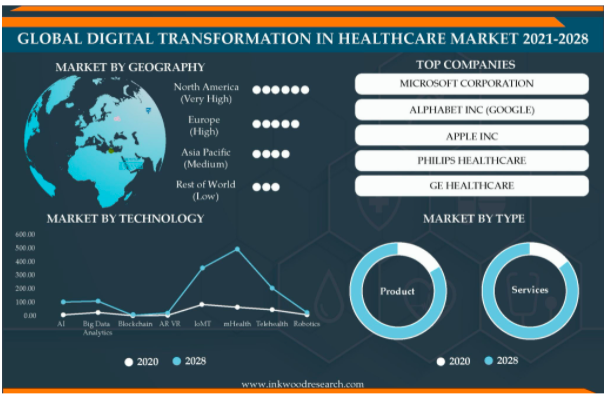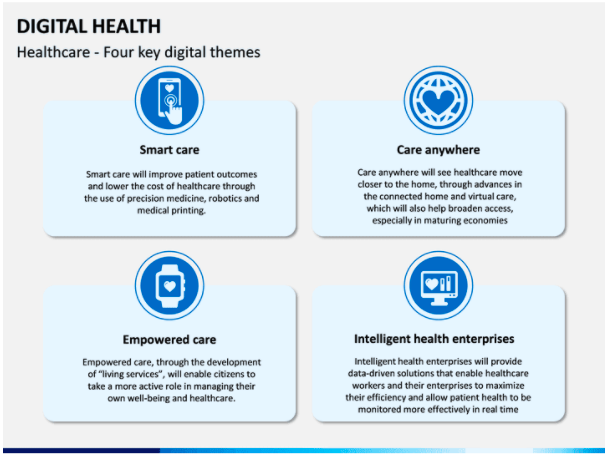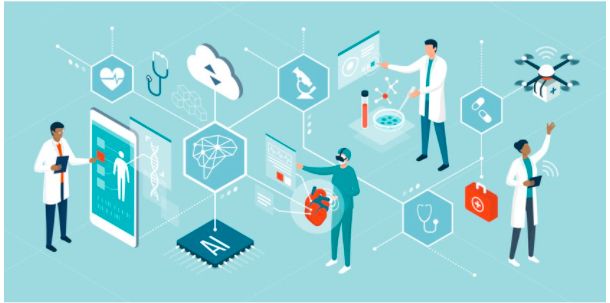The process of digital transformation in the healthcare industry is one of the perfect examples of how innovative technologies are changing lives for the better. By utilizing the best opportunities of artificial intelligence, machine learning, big data analysis, predictive analytics and the Internet of Things, the healthcare providers are welcome to achieve the ultimate efficiency while helping the patients at the best service level possible. Let’s find out why healthcare and digital transformation make a perfect match for both medical companies and their patients.
What Does Digital Mean in Healthcare?
What is digital transformation in healthcare? Regardless of the industry, digital transformation stands for the process of improving and optimizing the business models, processes, and cultures with the help of more advanced technologies. It means a significant shift from previously used tools and techniques to more innovative, data-driven, and effective ones, changing the whole vision the company delivers its services.
So, when it comes to the digital transformation in healthcare, it means employing the set of software solutions and medical devices to better address the business needs of clinics and hospitals, and most importantly, improve clinical outcomes for the patients. The recent pandemic has become the most powerful trigger ever for the healthcare digital transformation, and in response to this pressing necessity, more and more healthcare institutions begin to introduce innovative solutions in their everyday medical practices.
The global digital transformation in the healthcare market is also projected to rise.

What Are the Key Areas of Digital Transformation in Healthcare?
The key points for digital transformation in healthcare cover the following ones.

- Smart care. Transforming healthcare with the help of digital technologies means making it smarter and better optimized with the help of AI, Robotic Process Automation, and instant data transfer.
- Care anywhere. The ultimate goal of digitalization in healthcare is to make access to medical services equal. This goal can be achieved with the development of telehealth solutions, remote surgery, virtual diagnostic, and consulting.
- Empowered care. Empowered care means the combination of the efforts of medical institutions that offer patients advanced solutions for self-care and self-monitoring plus the self-awareness of the patients and their health-centric mindset.
- Intelligent health enterprises. These are the companies that have already integrated a lot of intelligent solutions in their medical practices – starting from simple Electronic Health Records and ending with remote surgery technologies, for instance.
What Technologies Are Driving the Process of Digital Transformation in Healthcare?
According to the Digital Transformation of Healthcare research, “Digital health care is distributed throughout a complex network of both human and nonhuman actors such as databases, hospital information systems, digital health records, electronic health cards, online patient communities, health-related apps, smart homes with ambient assisted living technologies, etc”
The following technologies drive digital transformation in healthcare, solving the needs of both patients and hospitals.
- Artificial intelligence. This is the top technology that drives the process of digitization in healthcare since its possibilities are almost unlimited. There are a lot of innovative use cases for AI in the health industry – getting started with student education and ending with remote surgery software.
- IoT. Wearable devices for self-monitoring, for example, smartwatches, are the simplest examples of the Internet of Things in healthcare. There are also smarter devices that are tailored to the specific use case. For example, there are systems that help patients with post-surgery recovery or smart home sets that monitor the behavior of elderly patients.
- Big data. Gathering and analyzing patient data makes obtaining valuable insights possible. Big data is the fuel for artificial intelligence, and the AI solutions, in turn, work for improving clinical outcomes, suggesting the best treatment strategies, predicting possible complications, detecting anomalies, and identifying the invisible health changes.
- Mobile apps. Telehealth and healthcare on-demand become possible because of mobile app development, which is seamlessly integrated with hospital databases, medical knowledge databases, and wearable devices.
- Blockchain. Blockchain offers an ecosystem to make health data access and transfer safer. It can be a worth considering option for healthcare software since medical data is pretty vulnerable.
What Are the 4 Key Challenges of Digital Transformation in Healthcare?
Despite the necessity to walk along the path of digital transformation, medical institutions face the following challenges when it comes to integrating intelligent solutions into their everyday practices.
- Accessibility. While the ultimate goal of healthcare digitalization and telehealth, in particular, is to make access to medical services equal, half of the world’s population still can’t access even basic healthcare opportunities.
- Data safety. There were 600 healthcare data breaches in 2020, and this indicator grows year after year. While to date there is no ultimate data protection tool, the issue of data safety is the most pressing concern of healthcare providers on the way to digital transformation.
- Compliance. Going digital means staying compliant with specific legal regulations, for example, GDPR and HIPAA. A lot of medical companies need competent consulting services, in addition to the development services to make sure they stay within the legal framework.
- Lack of resources. The process of digital transformation means the necessity to invest in more advanced solutions, maintain them and train the staff to work with them properly. The lack of resources is the top limitation for healthcare providers eager to deliver innovative medical services.
How Low Code in Healthcare Can Boost Digital Transformation?
As for the last challenge, there is an option to cut costs and get started with healthcare solutions development in a smarter way. Low-code development platforms provide the developers with a ready-made ecosystem that is enough to customize the future solution’s architecture, tailor it to the use case, integrate it into the business process, and validate its real-life feasibility.
What’s more, with the help of low-code development platforms the process of healthcare digital transformation is becoming faster and less risky since there is no need to hire a large and expensive development team. For example, Appollo Low Code Platform can be perfectly tailored to the needs of healthcare organizations on the way to digital transformation.
Conclusion
The process of going digital is essential for healthcare providers. It is even more important for their patients who can expect better healthcare opportunities using the capabilities of data analysis, self-monitoring tools, and predictive analytics. Surely, the process of digital transformation in healthcare can’t be instant – medical institutions need a lot of financial resources to make a step towards this path. A low-code development approach can facilitate this task, allowing healthcare companies to get started with the process of digitization at lower costs and with fewer risks.
FAQ
- What does digital transformation mean for healthcare organizations?
For healthcare organizations, digital transformation means the opportunity to improve the quality of delivered medical services, optimize their internal business processes and provide better clinical outcomes for their patients.
- Why is digital transformation important in healthcare?
Digital transformation is important in healthcare since it empowers healthcare providers with data that can be life-saving for their patients.
- How is digital technology used in healthcare?
There are a lot of technology use cases in healthcare. The simplest one is the smartwatches with a heart rate monitoring feature integrated with a smartphone and EHR. As for more advanced examples, there are AI solutions for remote surgery support and clinical predictions.













